#the quote from plato's symposium really speaks to me
Video
“Montero (Call Me By Your Name)” with every first beat removed
#music video#montero (call me by your name)#lil nas x#the quote from plato's symposium really speaks to me#I can't read greek so I had to look it up#but the tree writing says#'After the division the two parts of man each desiring his other half'#thank you aristophanes#am I accidentally becoming a classics blog?#maybe. maybe#yes I did impulse buy plato's symposium a while ago#shhhh#next up#phaedrus
930 notes
·
View notes
Text
Bottled Up
pairing: C.H. x fem!reader
category: angst, fluff
warnings: yelling, crying, insecurities
word count: 2.2k
notes: apologies for the tardy post, i wrote and rewrote and re-rewrote the whole angsty scene because i didn’t know if it was written well enough, i wanted to make sure you guys could feel the emotions that i vividly visualised and tried my best to put into words :( i did send it to a friend to check and she seemed to like it, so let me know how it goes for you, my loves. the angst for this one was inspired by 2 different songs - hold me while you wait by lewis capaldi and i will run from you by cemeteries. it’s not necessarily about the lyrics, but more about the melody and the mood you get into listening to them (they go in order). give those a listen :) also, beware of the upcoming philosophy references, i did study philosophy last year, hopefully no one gets triggered lmao

< previous next >
Is a person’s scent something a normal human being picks up on before taking into account the rest of their features? Would a normal human being remember said scent and be able to recognise it in a crowd full of strangers? Corpse wasn’t too sure about the answer, but one thing he did know, is that she smelled delicately sweet, like cherry blossoms, and that ever since he had noticed it during their game night a few weeks ago, he simply couldn’t let it go. It was intoxicating, but in a calming way.
━
Corpse and (Y/N) each lay on their beds in their own homes, going into the third hour of their call. He couldn’t exactly fall asleep, so he had decided to see what his dear friend was up to, and even though she was this close to succumbing to sleep, she said nothing and stayed up to keep his busy mind company.
“Okay, hot topic: what do you think about soulmates? More specifically the romantic type?” the girl asked, not knowing how much of a risqué question it was. How was he supposed to answer?
“I don’t really have an opinion on it. Why?”
“I read Symposium by Plato the other day and it presented an interesting concept about human beings. Basically-” Of course she fucking read philosophical books. How were they even having a conversation with each other? Why were they even friends? She was on a whole other level of smart. “-so this guy says that humans were like androgynous blobs, so they’d come in two sets of everything a normal person has. But those humans were so powerful, the gods were literally shaking in their robes, so Zeus decided to cut everyone into two to weaken them. But then humans became so miserable, they spent their entire lives searching for their other halves. In the end, Zeus kinda felt bad and said fuck it, I’ll give y’all dicks and vaginas for every time you wanna hug each other. And that’s the oldest explanation there is about the idea of soulmates.” she sighed, finished with her rant.
“That was...not at all the story I expected to hear.” she heard him mumble on the other side of the call. “Yeah, Greek philosophers were up to some reeal freaky things, you would have loved them,” he laughed at her joke, “I honestly think it’s cute. Not the whole cutting people into two thing, but like, longing for someone and then finding them because you finally feel complete. Don’t get me wrong, I’m a strong independent woman who doesn’t need a prince in shining whatever to sweep me off my feet. But it does sound nice, that ideal comfort, a person you’re just...meant to be with, I guess.”
There was a moment of silence that neither of them really minded, before it was Corpse’s turn to ask the second bold question of the night. “Have you found that person yet? Your soulmate?”
She’s never thought about it before, but she hasn’t really thought about soulmates that much either, it was a spontaneous thought she had said out loud. “I’m not sure, actually. (B/F/N) could be one, I guess.” (Y/N) shrugged in return. Wasn’t she going to ask him about it? She probably didn’t care that much. Understandable.
“My favourite quote about love is «You come to love not by finding the perfect person, but by seeing an imperfect person perfectly.». It’s by Sam Keen, the American philosopher. It maay be the hopeless romantic in me shining through, but I do very much agree with his statement.” Did this mean anyone could have a chance with her despite their fuckups? So if he were to try, would she-?
“Obviously, there are some things that just can’t be ignored or avoided, but at that point it’s preferences and personal tolerance. Depends on the person, ya know?” she swiftly added, unaware of the effect it had on him. Sick. Some people were just meant to rot alone.
The final question was posed by (Y/N). She’d be lying if she said she wasn’t at all curious. This little crush of hers had been steadily growing with every hang out, every laugh, every hug and every glance. There are rarely ever moments where one could casually discuss a topic this personal with friends, at least there weren’t with friends one had feelings for. This was the perfect opportunity.
“Corpse?”
“Hmm?”
“Have you ever been in love?” her voice was soft, her approach gentle.
“Well, I’ve been in relationships before, so I guess, yeah? It’s been so long, I don’t even know what love feels like anymore.” he let out a breath resembling a chuckle. Lamest fucking answer ever. But it was true. He hadn’t thought about love in that way in quite a while.
“A lot of people describe it as having an intense range of overwhelming feelings. Lightheadedness, slight shakiness, heart palpitations, some people have even reported losing their appetite. Crazy how human bodies work, huh? Oh! Speaking of chemicals-”
She had continued on to ramble about...chemistry? Eyes? Corpse couldn’t really hear what she was saying anymore, let alone concentrate on her words, as he pieced everything that’s been happening for the past few months together. The nauseating feeling. The pounding of his heart so fast it felt like he was about to die. The urge to make as little eye contact with her as possible, because otherwise he’d turn into a furnace. The obsession with her perfume, like he was some fucking creep. The fool was falling in love. And it was at that moment that everything had come crumbling down.
━
(Y/N) and Corpse hadn’t talked for a couple of weeks. Or rather (Y/N) messaged the 23 year old many times, but he’d either claim to be busy or just not answer at all. There were two possible reasons for the sudden lack of contact: he was indeed busy with his musical projects and couldn’t allow himself to be distracted; or something much more serious was going on. It didn’t matter, for she was already in her car, on her way to his apartment.
Arriving at her destination, she used the spare key he gave her months ago, a sign of absolute trust, and allowed herself into his humble abode. Silence reigned in her friend’s residence. She thought maybe he had gone somewhere, and though that was unlikely, it wasn’t unprecedented. The door to his recording room was closed, and while she was tempted to check if he was in there, she refrained from doing so, knowing that specific room was not to be entered unless he was around to give permission.
“Corpse?” she called out just to make sure. There was no response for a few minutes, which made her assume she had the place for herself, until she heard a door open behind her. Turning around, she saw his figure emerge from said recording room in a white t-shirt and black sweatpants, his curly hair disheveled.
“Hey, how are you d-”
“Why are you here?” he spoke flatly, interrupting her. “Well- You weren’t, um, answering your messages or any of my calls, so I thought something had happened.” she replied, suddenly nervous, fiddling with the rings on her fingers. “Nothing happened. I told you I was busy.”
The air around them seemed colder as tensions rose. (Y/N) could tell he was irritated, but she couldn’t exactly figure out why. She had never seen this side of him before. “Okay. Tell you what, I assume you haven’t had dinner yet, so why don’t I go ahead and start cooking something up while you-”
“Get out.”
She blinked a few times, not quite registering the words that had just left his mouth. “Sorry?” Her voice was quiet. She was taken off guard.
“Are you deaf? I said get. the fuck. OUT.”
Corpse shouted the last word, making her flinch in what appeared to be fear. Good. Run away while you still can. Heart pounding, (Y/N) took a second to remind herself whom she was speaking to. “I see that you’re angry, but at least give me a reason why-”
“You want a reason? I just don’t fucking WANT you here!” Anger grew inside of him like a tumor, but it wasn’t intended for her. She had simply been caught in a storm that had been building up for years. “Do you understand that?! I can’t fucking be around you without feeling like I’m going to EXPLODE.”
His words hit her like paintballs. They were only words, plain and simple, but they dug deeper and deeper into her skin with each hit, until, eventually, it broke. Eyes burning, she felt the tears slowly welling up in them.
“Why are you doing this to me?!” her own voice grew louder with frustration, but mostly, confusion.
“Maybe because I can? Because I’m a goddamn asshole?”
“Don’t say that.”
“How?! How can I not say it when it’s the truth!” He wanted to stop. His mind told him to cease whatever it was that he was doing. However, blinded with resentment towards himself, he only spilled words he would regret after it was too late.
“I can’t function like a normal fucking human being. I can’t be a good friend, son, or whatever the fuck else, and I sure as hell can’t love you.”
The paintballs had turned into a singular sword. A very long, very sharp sword that had found itself plunged deep inside her chest. How did he found out? When? Had she been too obvious? Had she been pushy? Clingy? Way out of line? The woman before him was unable to conceal her shock, as tears came rushing down her hot cheeks. Her voice brittle, she tried defending herself. She couldn’t leave it at that. She had to try. Try to have him see reason. “You don’t love me, that’s fine. But you didn’t have to deliver it this way-”
“But I did.” breathless with fury, Corpse clenched his fists so tight they had turned cold, yet they were still trembling. “You can get so naïve and dumb, you won’t understand things unless they’re spelled out nice and fucking bold for you.”
He closed with (Y/N) until their noses nearly touched. He noticed the way she silently shook, her eyes which shed endless tears never leaving his gaze. Unable to make a single sound, she felt the man’s hot breath on her face, his aura domineering.
“Now get. out.”
Her body wouldn’t cooperate as she just stood there. Staring back at him, her inner brows raised. Corpse wanted to hug her. Envelop her trembling figure with his and tell her he was sorry, that he meant none of it, that he had lost his mind. But he couldn’t bring himself to do anything. And with his own tears threatening to spill, he created a distance between them. He needed her gone.
“Leave! GO!”
His yelling was enough to jolt (Y/N) out of her trance, and, in a hurry, she sprinted towards the entrance. The door closed behind her, she felt a sudden urge to fill her lungs with much needed air. She jumped at the resounding scream that emanated from deep within his soul, letting out all of his pent-up rage.
Feet carrying her all the way to her car parked outside of the building, the young woman managed to climb in, and this was the queue for her body to break down. The night was young. The street empty. No one around to hear her long-lasting wailing. She clutched the steering wheel for support, fingers wrapping around the leather in a tight grip. A headache was creeping up from the back of her skull. Her ears pulsated in response to the heavy pounding of her heart. Clumsily, (Y/N) inserted the key into the ignition, felt around for the gear stick, and drove away. She didn’t know where she was going or how long it was going to take to get there. She needed to get out.
What went wrong? When did it go wrong? She couldn’t help but feel guilty, feel at fault. She had never seen that side of him before. He had never treated her that way before.
It was the hugs, wasn’t it? He had to have noticed the way she held on for a second too long to enjoy the smell of his cologne. Her vision blurred as she resumed softly weeping, her salty tears staining her top. Or it might have been the touchiness, she would practically glue herself to him during their movie nights. Unaware of both her actions and surroundings, (Y/N)’s breathing quickened, becoming ragged. Maybe he didn’t like the way she called him three times a week. Her hands were slowly losing control over the wheel, over the vehicle she was driving. She invaded his privacy. That was definitely it. Fuck. How could she have been so damn blind, selfish, ignorant, FUCKING STUPID.
Lights. Something was moving towards her- MOVE.
With a sharp turn, she dodged the approaching car just by a hair’s breadth, but as she had avoided one accident, another came just as quickly.
312 notes
·
View notes
Text
Specific references in Pomegranate Seeds, sorted by chapter
Title of work: Pomegranate Seeds
A reference to the myth of Persephone and Hades, where Hades is the god of the underworld who kidnaps Persephone – the daughter of Demeter, goddess of agriculture and harvest – and makes her queen of the underworld. He gives her a pomegranate to eat, and for every seed she swallows she has to spend a month with Hades in the underworld. During the months she is with Hades, she is gone from her mother, and that’s why autumn and winter exist (since Demeter is grieving the loss of her daughter). Spring and summer are the months when she is back with Demeter, and Demeter is once again happy. The myth has lots of interpretations, but my favourite is the one where it is said to be based on the trauma of both daughter and mother as they are separated when the daughter gets married and enters a new household.
Even though Giorno’s mother didn’t treat him well, her death was most likely traumatic to him. He enters the new household of Dio (Hades) and every time they touch each other in a way that isn’t befitting father and son, one could say that Giorno swallows another pomegranate seed, and it binds him to the underworld. In this case, the underworld would both represent the criminal world, but also the trap of their incestuous relationship that he then cannot leave, should he want to.
No specific references in chapters 1 & 2.
Chapter 3:
Demetra – Giorno’s mother doesn’t have a name in canon, so I made one up. Demetra is the Italian version of Demeter, which is the name of the Greek goddess of agriculture and harvest. The goddess is the mother of Persephone, and the title of this fic – Pomegranate Seeds – is a reference to the myth of Hades and Persephone.
The biblical paintings in the church – John the Baptist (martyr) was beheaded, and Judas (traitor) hung himself. The imagery around Eve, the snake and the red apple, well… depending on how you interpret the story in the Bible, this could mean that the scene doesn’t represent a fall from grace, but rather that it was God’s intention to have humanity step into the broader world.
Dio’s books – I mostly just had a look at my own bookshelf, but I purposely included Nabokov, Machiavelli, and Plato. Nabokov, of course, references his infamous novel Lolita. Machiavelli was an Italian politician and philosopher during the Renaissance, and he’s most famous for his book The Prince, where he gave rulers quite… devious advice, not shying away from unethical and corrupt means. Therefore Machiavelli and the derived term Machiavellian often denotes (political) deceit. And Plato, well, in his text The Symposium he speaks of the ancient practice of pederasty in a very positive manner, and claiming that it is the purest form of love.
Aniara – I picked the book because it’s my sister’s favourite. It is a book-length epic science fiction poem that narrates the tragedy of a large passenger spacecraft carrying a cargo of colonists escaping destruction on Earth veering off course, leaving the Solar System and entering into an existential struggle. This is the “space-travel” Giorno later reflects on while in the bath.
No specific references in chapter 4.
Chapter 5:
The next reference to Machiavelli – Giorno thinks about Machiavelli and the question if it is better to be feared or loved, which is something Machiavelli writes about in his book The Prince, where he states that it is better for a ruler to be feared than loved, if they cannot be both.
No specific references in chapter 6.
Chapter 7:
Reckless – Giorno notes that Dio wants him “recklessly, passionately”. This is one of the two times the word “reckless” is used in this story; the only other time being in the first chapter when Giorno’s mother dies after her car collides with a reckless truck. Dio’s desire for Giorno is tied together with that accident, as if it’s equally dangerous.
Jewel – “Yes, Giorno would like something like that; to show Dio that he was a prized jewel, cut to fit perfectly in the curve of his palm.” This line directly references the Song of Songs 7:1 “Your rounded thighs are like jewels, the work of a master hand.”
Eden – “How truly unfortunate, that the most tempting fruit should be found in the middle of Eden.” The garden of Eden, in the Bible, is where life is first created by God. It can therefore also symbolise family, where life also is created. So what Dio essentially says here is “what a shame the most fuckable person is found in my family”.
Draconic tendencies – Giorno having “draconic tendencies” is a reference to his earlier thoughts about Abbacchio hoarding Bucciarati like a jealous dragon.
Chapter 8:
Buttercups – Giorno picks a bouquet of buttercups for Dio, and buttercups have traditionally been associated with childhood. It is meant to express that Giorno, no matter how mature he himself is convinced that he is, still has a childish edge to his affection. As a fun aside, the Latin name for buttercups is Ranunculus, which means “little frog”.
Leda and the Swan – the painting Dio has in his study. It is, of course, an erotic yet controversial motif in itself, but there are some references to the Greek myth it is based on. In it, Zeus disguises himself as a swan and copulates with Leda. It is not entirely clear if it is by rape or seduction. Zeus, of course, is known for his sexual escapades, his violent temper and jealousy, but here he disguises himself as a swan, which is an animal that in European culture often has symbolised love and fidelity. This story of a shady person disguising himself as someone loving, to enter a relationship where consent is dubious at best, well… I think the implications are clear. As a fun aside, the name Zeus and the name Dio are directly connected.
Uneasy lies the head – the whole quote is “uneasy lies the head that wears a crown”, a saying from Shakespeare’s play Henry IV, Part 2, meaning that someone with great responsibilities won’t be able to rest properly.
The prodigal son – it’s a reference to a parable in the Bible, from Luke 15:11-32. The story goes that a son requests his inheritance early, spends it all irresponsibly, and then returns home to beg his father to let him work for him. His father, however, welcomes him home with open arms and throws a feast, which indicates that he has hopefully waiting for the son to return.
Nakedness – the scene in Giorno’s room, where he lowers his duvet to display his “nakedness”, the word choice here is important. Except for Genesis 42, all biblical occurrences of the common idiom ”to see the nakedness of” or “to uncover the nakedness of” are explicitly sexual, usually referring to incest. The Classical Hebrew word 'erwā is not “nudity” but “nakedness”, in the sense of something that is unseemly or improper to look at or expose; often used to denote forbidden sexual relations.
Chapter 9:
Wine-dark – Dio’s eyes are described as wine-dark, which is a reference to the use of “wine-dark sea” in Homer. It’s an epithet used in the Iliad and the Odyssey, of uncertain meaning. What exactly does it mean that the sea is “wine-dark”? Is it a reference to the stormy sea being unpredictable, like someone who’s drunk on wine? Or does it tell us something about how ancient Greeks perceived colours, where maybe depth and opacity levels were more important than hues?
Ambrosia – Giorno compares the taste of Dio’s seed to ambrosia, which is the food and drink of the gods in Greek mythology.
Lollipop – Giorno is sucking on a lollipop while he’s out shopping. This is a shameless reference to the most culturally recognised image of Nabokov’s Lolita, where Sue Lyon, the actress who portrayed the character Lolita in Stanley Kubrick’s film adaption of the novel, is sucking on a red lollipop while wearing heart-shaped sunglasses. It’s worth noting, however, that the character Lolita doesn’t eat a lollipop in the novel or Kubrick’s film, and the images were only used for promotion. Either way, the lollipop has nonetheless become a symbol for playful, youthful temptation.
No specific references in chapter 10.
Chapter 11:
Dio’s alarming beauty – Giorno reflects on how beautiful Dio is, that he is alarmingly beautiful. This is a reference to a quote from The Secret History by Donna Tartt: “Beauty is rarely soft or consolatory. Quite the contrary. Genuine beauty is always quite alarming.”
Chapter 12:
Kisses – there’s a lot of descriptions of kissing in the beginning of this chapter, and it is all a reference to the biblical book Song of Songs. “Honey-sweet kisses that melted his tongue” is a reference to Song of Songs 4:11 “honey and milk are under your tongue”. On a more complicated note… “those kisses, Giorno drank them from his mouth like they were life-giving water” is a reference to Song of Songs 1:2 that should be “I want to drink kisses from his mouth”, however, most translations will read “let him kiss me with the kisses of his mouth”. It’s really complicated as to why I and others would translate it differently, but in general it has to do with the manuscript and the Masoretic editors’ vocalisation, which in turn has a lot to do with evaluating Classical Hebrew grammar and poetic conventions… I am going to spare you that lecture, but I still wanted to let you know that you won’t find that wording in most English translations of the Bible.
The garden, Eden, and juvenile sex – this all ties together. The garden of Eden is, in the Bible, where life is created and before “the fall of man”, it is a place of peace and innocence. Now, it might seem strange to refer to innocence in a story like this, but there still is a certain kind of innocence to their relationship, especially on Giorno’s end. They are described as “easy and unafraid, in full view of God”, which again is a reference to the biblical creation story; after “the fall of man”, when Adam and Eve have sinned, they are suddenly afraid of God and tries to hide from him, and for the first time shield their nudity, since they have now lost that innocence. So, Dio and Giorno being unafraid in full view of God is another reference to them being fairly innocent. At least that’s how Giorno conceptualises it.
Satyriasis – a word for excessive sexual desire, and an outdated term for hypersexuality. The word was developed in relation to the satyrs of Greek mythology, who were lustful woodland gods.
Nipple play – Giorno sucking on Dio’s tits, well… quite obvious reference, but if you missed it; it’s a reference to breastfeeding and nourishment.
Sunlight – in Stardust Crusaders, Dio tells Polnareff that he too has pain in his life because he can never see the sunlight, since he is a vampire. In this story, Dio isn’t a vampire, but I still wanted to include this pain. Dio’s love for the sunshine, and the depravation of it in his childhood, is my attempt to reconceptualise it.
Chapter 13:
Ice cream – elder flower sorbet has a tendency to taste like laundry detergent if you’re not careful, so Mista definitely picked the wrong flavour that time.
Know thy enemy – “know thy enemy” is a famous quote from The Art of War by Sun Tzu.
Chapter 14:
Paradise burning – more Eden references, they never truly stop.
Loins – in Classical Hebrew, one specifically emphasises that a child has sprung from someone’s loins to indicate that it is a biological child rather than an adopted one.
Deadly sins – Giorno notes that one of the seven deadly sins, sloth (that is, excessive laziness and indifference), doesn’t come as naturally to him as others would (such as lust or pride).
Know thy self – another reference to the famous quote of Sun Tzu’s The Art of War.
Companion – Giorno thinks about how the universe has blessed Dio with a companion that can keep up with him, which is a subtle reference to the creation myth in the Bible. There, God creates the first human, Adam. Adam attempts to find a companion amongst the other creatures, but cannot find an equal until God creates another human – incidentally, God creates another human from Adam (by his rib), which of course parallels with Giorno being created from Dio, since he is his biological child.
Clay – the dream Giorno has of Dio forming him out of clay and breathing life into him is another direct reference to the creation myth in the Bible, where God forms the first human out of clay/soil/dust from the ground and breathes life into his nostrils. Similar creation myths are found in several ancient Near Eastern religions. If you want a little more “fun” fact, the first human is named Adam, a name he gets from the Classical Hebrew word for “man” (as in human – not male), which is adam, and the word for “ground” is adamah, which ties to all together quite nicely.
Nakedness – Dio uncovers Giorno’s nakedness, and just like in chapter 8 it’s a biblical reference. Except for Genesis 42, all biblical occurrences of the common idiom ”to see the nakedness of” or “to uncover the nakedness of” are explicitly sexual, usually referring to incest. The Classical Hebrew word 'erwā is not “nudity” but “nakedness”, in the sense of something that is unseemly or improper to look at or expose; often used to denote forbidden sexual relations.
Chapter 15.
Cuddling – after having breakfast, they cuddle, and their position is described as Giorno resting his head on Dio’s left arm, and Dio draping his other arm over Giorno’s waist. This position is a reference to the biblical book the Song of Songs 2:6 “His left arm is under my head, and his right arm embraces me.”
Angel lust – Dio gets hard after Giorno chokes him, which he says is a perfectly natural reaction to being choked. Which it is! “Angel lust” or “death erection” refers to the phenomenon of men executed by hanging having an erection, because of the increased downward blood flow. After observing this, doctors in the 17th century started prescribing choking sex to men with erectile dysfunction, and that’s partly where erotic asphyxiation comes from.
England – the phrase “lie back and think of England”, alternatively “close your eyes and think of England” is an old-timey reference to unwanted sex that one doesn’t enjoy – specifically used for sex within a marriage, which at least back in the day was more of an economic arrangement than a love affair. Disgustingly, it means “just lie back and endure it”.
Bone of my bones, flesh of my flesh – this is another reference to the creation story in the Bible. The specific verse is Genesis 2:23, when God has created another human to be a worthy companion of the first one. Adam, the first human, has searched for a companion among the animals but been unsuccessful to find an equal. But when he meets the newly created Eve, the second human, he exclaims “At last! This is bone of my bones and flesh of my flesh” (since she was created from his rib). That “at last!” is very sweet – and fits in this story too! Dio has finally found a worthy companion to share his highest highs and deepest lows with.
Chapter 16.
Roses – Giorno buys a bouquet of roses for Dio. This is intended as a contrast to the buttercups he picked for Dio in chapter 8, being that roses are a much more “mature” flower than buttercups, therefore showing that Giorno has matured. Also, the fact that he buys the bouquet of roses while he picked the buttercups indicate a certain loss of simplicity and naturalness in their relationship.
Fin.
#/#//#///#////#/////#just fanfiction stuff pls look away#i tried to make this a private post but tumblr be fucking with me#pomegranate seeds references
13 notes
·
View notes
Text
Plato’s Symposium Summarised (for fun and definitely not education)
[Basically this]
Some random guy: Hey Socrates, wanna go to Agathon’s dinner party with me?
Socrates: Yeah Agathon’s good-looking!
Some random: We have to come up with something to say to them about why you’re here though.
Socrates: Oh yeah!
[They talk for some time about what explanation they’ll use, that they have to have a reason for why Socrates is with him etc]
Some random: How about we say that I invited you?
Socrates: Sounds good!
[They arrive at Agathon’s house]
Some random: Hey guys, Socrates is coming with me but he’s not here yet, he’s talking to the neighbours or something.
Everyone: That’s cool! Socrates is like that.
Somebody else: We should have rules for drinking.
Everyone: Good idea, drinking too much can be bad for you.
Also Everyone: So the rules for drinking are each man should drink as much as he wants.
Somebody I forget who: We should each compose a panegyric ode to the god/concept of love.
Everyone: Yeah good idea literally no-one’s ever done that before.
[I think somebody else goes first but the first one I remember is …]
Pausanias aka “Pasta Sauce”: There’s two types of love, the common vulgar type and the higher type. The lower type is the love of the body, the higher is the love of the mind. The lower type is for child abusers and straight men. The higher type can only be experienced between two consenting ‘of age’ men cause women don’t have minds amirite?
Some men abuse underage boys and that is shameful, but also some young boys are gold diggers/just trying to get status from their older lovers and in that case they are the shameful ones.
Being in love makes you do crazy things that would otherwise be considered crazy but it’s totally fine if it’s in the name of love.
Also the Persians are bad and homophobic (and coincidentally our enemies)
[Then it was Aristophanes’ turn]
Aristophanes: Hiccup!
Eryximachus aka “Eric Maxis”: You should hold your breath, or drink some water or just wait and I’ll go first. I’m a doctor, and love is a lot like the body, since I’m a doctor by the way, all my analogies are about the body from a medical perspective. Did you know that I’m a doctor?
Aristophanes: Now I’m totally not joking when I tell you this. Once upon a time humans were two people stuck together, with two heads, four arms and legs etc. Our backs were facing the same way as our heads and genitals. We were super happy then and this annoyed the gods. We used to cartwheel (the fastest method of travel) right up to the gods and be rude to them and they were like what are we gonna do about these humans?
So Zeus cut us in half down the middle, and turned our heads around so we’d be looking at the place we were cut and be ashamed (that’s what the bellybutton is). And then everyone was sad, except when they found another person and then they’d cling to them, all the time, to the point where they wouldn’t eat and would die. So Zeus was like let’s turn their genitals around, so now when they were clinging to each other and facing each other, they could come to something of a –resolution- of their feelings. Now they ate, but still they didn’t part from each other much.
There were three types of humans before they were split; one made of two females, one two males, and one was half male half female. So the people who came from one gender wholes are only attracted to the same gender and people from a male/female whole are attracted to the opposite gender [I never expected bi+ erasure to come from ancient Greece but there you go]
The male attracted men are the best cause that’s the most masculine. Agathon and Pausanias are totally in that group. [Wikipedia says Agathon was ‘notoriously effeminate’ so my guess is this is irony].
If you happen to find the specific half that you were separated from then you’ll be super in love and this is called soulmates.
And by the way I was totally not joking, why won’t you take me seriously? Is this cause I’m a comedy playwright?
Agathon: [Agathon has in my opinion the best speech about love, he says how it can be more than just romantic love, how it can be a passion for creating art/music etc, it’s good even though I can’t remember it that much]
Socrates: Instead of telling you my actual opinion I’m just going to quote this woman who once tried to recruit me into her mystery religion cult. [Mystery religion is an actual type of religious category, Christianity was one of them, though much later]. Her name was Diotima.
Diotima: Do you know anything about love Socrates?
Socrates: Nope I’m an idiot!
Diotima: That’s cool, I’ll tell you about it. It’s not all good and beautiful like you might think, in fact it desires what is good and beautiful so the god of love doesn’t have those things. So he’s not good and beautiful, or at least he’s somewhere inbetween, shades of grey and all that. He is the child of Poverty and Invention [I think. She goes on for ages and I can’t remember].
That’s the basic understanding of love but the only way you’ll fully understand it is if you initiate yourself into my religious cult! Just go through the initiation ritual and then you’ll have all the secrets revealed!
Socrates: And that’s my speech on love.
Everyone: Well I guess that’s it, I mean we left Socrates till last for a reason, pack your bags folks, that’s all –
Alcibiades aka “Alcopop”: [crashes through the doors] Hold my amphora!
Agathon: Hey Alcibiades we were just each saying an ode to the god of love do you want to join?
Alcibiades: I am utterly drunk so it won’t really be fair- Wait [sees Socrates] WHAT is THIS man doing here?!!!
[Socrates sighs]
Agathon: Well there’s a long and convoluted story behind it, you see someone I invited invited him, isn’t that crazy? [Ok I added that bit]
Alcibiades: Good luck trying to get me to speak in praise of love, this man [points at Socrates] REFUSES to let me praise any other man but him!
Socrates: It’s really the other way around
Alcibiades: Ok ok, I’ll compose an ode to Socrates and he can sit there and tell me if anything I say isn’t true. How about that Socrates? Would you agree to that?
Socrates: Sure
Alcibiades: Well fine then.
Alcibiades: Let me tell you what this man has done to me! I tried my hardest to seduce Socrates (and it should have been the other way around btw!) I tried to seduce him at the gym, I tried to seduce him after a dinner date, then I tried the direct approach in bed but he still refused to sleep with me!!! (Except in the literal non-sex sense). He won’t love me and it is a CRIME! Ugh but he’s such a good speaker no one else can speak like him, I want his wisdom listening to him speak is the only time that I don’t feel like I’m better than everyone else. I’m in constant awe of him even when we were in the military together he was noble and thoughtful and idiosyncratic and also saved my life that one time no matter how much salt I throw at this magnificent man GOD I can’t stop being in love with him it hurts!
Also he won’t let me sit next to Agathon cause he wants all the beautiful men to himself.
Everyone: Alcibiades we think you’re less drunk than you’re pretending to be.
[Then like, everyone in the street I guess, shows up at the party cause Alcibiades left the doors to Agathon’s house open and them’s the rules. Most people ended up crashing, Socrates stayed up all night chatting to someone (not Alcibiades or Agathon) cause he apparently is a superhuman who doesn’t get drunk, feel the cold or need to sleep.]
[And somehow this was all transcribed by Plato who, you may notice, wasn’t even there]
#Plato#symposium#socrates#agathon#alcibiades#aristophanes#pausanius#eryximachus#philosophy#ancient greece#gay#naturally#platonic love#classics#love#philosophy summary#rules for drinking#seducing socrates#queer#funny#i hope#hold my amphora
51 notes
·
View notes
Text
Why Lea and Isa Needed to Heal Each Other’s Pain With the Power of Waking
“The mind forgets, but the heart will always remember. And what is the heart's memory but love itself?” — Twan Eng Tan

Aqua: “It's the power of true love that defeated you.”
Maleficent: “I will not be defeated by something as insignificant as love.”
Aqua: “You don't even know the first thing about it. You're too clouded by darkness to see that there's something greater.”
Besides Lea and Isa, I also really love Terra, Aqua and Ventus. Terra and Aqua’s relationship also felt romantic to me. Along with Axel, she sounds like she’s speaking from experience when she mentions love — romantic love. But that’s just how I personally interpreted it. Since Aqua is one of the wisest and most mature characters in the series, I didn’t have trouble believing her when she talked about the power of love.
“All that’s left in my heart is misery and despair, and I want you to feel it!”
Her love for Terra is so great that it leads her to sacrifice herself. She doesn’t just retrieve him from the abyss; she stays in his place. Unlike Terra, Aqua didn’t have a problem controlling her darkness. She was filled with light. Yet, purely out of love for Terra, she chose to take on the burden of his darkness and despair, instead of letting him suffer alone. She didn’t have to. She wouldn’t have fallen into darkness on her own. She chose to.
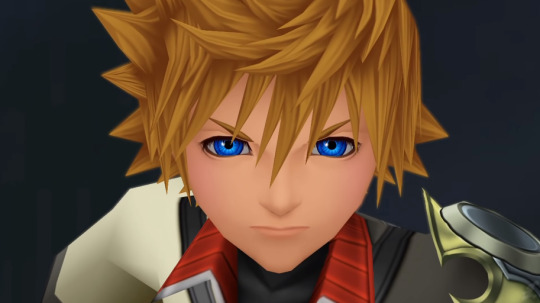
Ven: “Whatever it takes. Anything to save Terra and Aqua.”
Vanitas: “Hmph, it's always about your friends, isn't it?”
Ven: “At least I have some! I've become a part of their heart, just as they've become a part of mine. My friends are my power...and I'm theirs!”
It was Terra and Aqua who helped Ventus heal after Xehanort failed at turning him into a vessel. Ventus’ heart collapsed the first time. He didn’t fight back and he became a lifeless doll. The second time around, he had the strength to willingly accept the total annihilation of his existence, all to save his two friends. Although Xehanort said he was too frail and benign to be a good vessel, I think he was wrong. His heart just needed someone to fight for.

“Aqua, Ven... One day I will set this right.”
Terra starts off thinking he just wants to be stronger, but as soon as he lets his heart do the talking, his thoughts always turn to his loved ones. The only way Xehanort can make someone his vessel is to fracture their soul, but not break their heart. Most of the subjects he tried this on during his experiments suffered the total collapse of their heart. Only very rare individuals have a heart strong enough to endure that level of darkness. Of course, the heart’s strength is totally dependent on one’s relationships with others. In order for the heart to not break, you need to have a bond that is so strong, it can withstand even the shattering of your soul.
“I’m not afraid of what the darkness holds now. Even if you do wrest control of my heart from me, even if you cast me in the deepest, darkest abyss, you’ll never sway me from the one cause that pushes me to keep on fighting. Whatever the cost, I’m ready to pay it.”
You need to love another so much that you can stare down the deepest, darkest abyss for their sake. You need self-sacrificing love. That’s what Terra, Aqua, and Ven had. Terra had a purpose, a vow he made to his friends to set things right. The strength of his heart is initially what caused him to be used as a vessel, but it was also the strength of his heart that allowed him to wrest control from Xehanort and finally set things right.
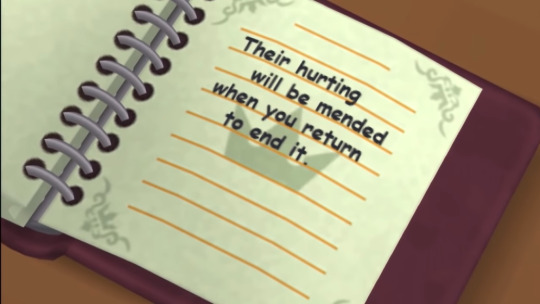
Joshua: “By ourselves, we're no one. It's when other people look at us and see someone — that's the moment we each start to exist. All they needed was for someone to see them, connect with them.”
And while I thought the Wayfinder Trio had a mostly (but not completely) satisfying story, I cannot say the same about Lea and Isa’s story arc. The main theme of Kingdom Hearts 3 was supposed to be "ending hurt". But the story never addressed either of them healing their pain. I think Lea and Isa were supposed to have a relationship just as meaningful as Terra, Aqua, and Ven's.
This isn’t even about personal shipping preferences (as much as I do ship them). I believe that the writers had something very beautiful planned for Lea and Isa’s relationship, but it turned out quite differently than how it was originally envisioned. Their relationship seemed to be heavily inspired by the concept of Twin Flames or Twin Souls. Same-sex ones at that, which is refreshingly unique in fiction. Twin Flames are the key to healing each other's pain.

Axel: “Love is what happens when there’s something really special between people.”
Roxas: “More special than friends? Like…if they’re best friends? Inseparable?”
Axel: “Well, you can care about your friends, but that’s not exactly it…”
The concept of having a “Twin Flame” originated in Plato’s mythic dialogue entitled “The Symposium” which wrote that human beings originally had two faces, four arms, and four legs. Under the threat of being overpowered, the gods split them in half, creating the humans we see today. Hence, it is thought that we all have one “twin” soul out there in the world. Twin Flames are a divine expression of Balance, Harmony, and Unconditional Love.
A Twin Flame, or Twin Soul, is a person who you feel connected to not just on a physical and emotional level, but also on a spiritual level. Twin Flames are our friends, our lovers, and our teachers. They are the yins to our yangs, the suns to our moons, and the light to our darkness. Twin Flames are also our mirrors in that they reflect back to us all of our hidden fears and shadows, but also our true inner beauty and strength. In this way, Twin Flames open the door to tremendous emotional, psychological, and spiritual growth.
Put simply, the purpose of the Twin Flame relationship is to help shed away the snakeskin of the ego, face and heal both of their wounded hearts, and transform each other into awakened beings. The love experienced between Twin Flames is said to be like Holy Fire: it burns you to ashes, but it also forges you into a new creature, like a Phoenix emerging out of the dust. Twin Flames have a reputation for coming in and out of your life. Or often some outside force stands in the way of you being together. But it seems like you’re always pulled back to them in one way or another.
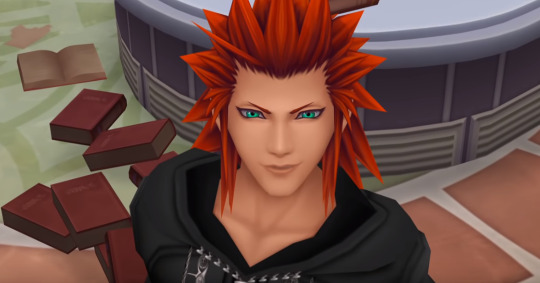
“Go on, you just keep running. No matter how many times you leave, I’ll bring you back. Every time.”
Twin Flame relationships are notorious for what is called the “runner and chaser dynamic”. The chaser waits for the return of the runner, having the patience of a saint while working on their own issues as each day goes by. During this period, the chaser is hoping that the runner wakes up to their spiritual call, while at the same time healing their own past wounds. Twin Souls may share only a brief moment in time, but the chaser keeps the faith that one day their counterpart will reach out again. Months or years go by…and then… one day...they call.
Rhyme: Aw, it's no big deal. You know what they always say — "Sometimes memories just need a little help getting out."
The runner does not understand what’s happening to them on a spiritual level. They feel like they’re losing control over their own emotions. They don’t know what to do, so their natural reaction is to run away, and chasing after them only makes them run even more. Inner healing is crucial for this type of journey to even have a chance of working out. Reuniting with your Twin Soul requires patience, and lot of inner work is necessary to be ready for them.
“And if the darkness gets ya, I promise I'll bail you out. "Dark Rescue" is my middle name.”
Well, Lea is definitely the chaser. And what could possibly be considered more “running away” than going to the Realm of Sleep? Soul fragmentation is the ultimate form of running away. You literally leave material reality because you cannot handle the pain of conscious awareness anymore. Someone else has to enter the darkest parts of your subconscious and chase down all the broken pieces of your soul just to bring you back. The main theme of Lea and Isa’s relationship is “memory”. I think Lea was going to be the one to heal Isa by using the power of waking on him and in doing so, he would be healed as well. Bringing back a person’s fragmented soul is all about healing and unconditional love.
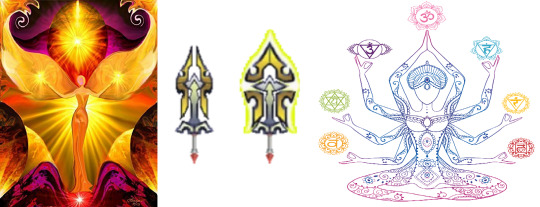
Naminé: “Some people think pain is something you can just wipe away — and sometimes, maybe, you can. But not all pain can be erased. The only way to deal with it is to accept it head-on. And if the hurt is too great for you to bear it alone — well, then you turn to a friend close to your heart.”
Saix has two weapons of the same shape called Light Year (a reference to Axel’s famous quote about red light) and Luminary, which is how the ancients referred to the Sun and Moon. Luminary is one of only two weapons he can upgrade to ++ status. And it is shaped like common depictions of Reiki, one which looks like an angel. Reiki is a Japanese healing technique based on the principle that someone can channel their energy into the afflicted person by means of touch, activate the natural healing processes of their body and restore their physical and emotional well-being. In Reiki, the color of a person’s aura has a specific meaning and so do colored healing gemstones.
The aura is gold, which is the strongest color to help cure all ailments. It nourishes the whole being — body, heart, and soul. It is useful for healing and mental clarity. It is simple and gentle. Gold also represents awakened spiritual power and energy. When an abundance of gold is found in the aura, the person radiates and glows, becoming like the Sun. Spiritual masters who achieve this level of enlightenment see their auras fully restored and they are able to radiate energy to heal others as well. Just like Kairi did for Sora. The weapon has a red tip. Red jasper stones are about protection, stability and security. I have no doubt that this weapon represents what Lea is to Isa.
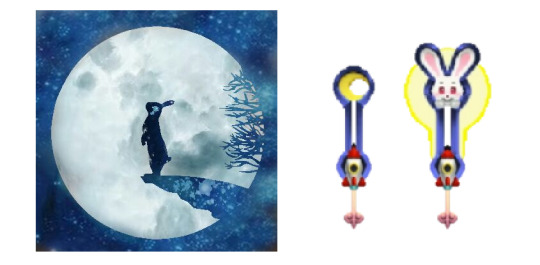
Xaldin: “To hold something dear is to let it hold you. His heart is in thrall to it, don't you see? And that, Roxas, is ample weakness.”
In 358/2 Days, the Mystery Gear’s description is: “A weapon that draws forth its wielder's personality.” Saix’s version of this weapon is called Moon Rabbit. The story referenced by Saix’s weapon is called The Hare on the Moon.
Morals from The Jataka: The Hare on the Moon
Long ago, the Buddha was reborn as a hare. The hare had three friends–a monkey, a jackal, and an otter. The Lord of Heaven was watching the four friends from his great palace on the peak of Mount Meru, and one day, he decided to test their virtue. The Lord of Heaven took the form of a priest, and he went to the otter and said "Friend, I am hungry. I need food before I can perform my priestly duties. Can you help me?” And the otter offered the priest the seven fish he had gathered for his own meal.
Then the priest went to the jackal and said "Friend, I am hungry. I need food before I can perform my priestly duties. Can you help me?” And the jackal offered the priest the lizard and curdled milk he had planned to have for his own meal. Then the priest went to the monkey, and said “Friend, I am hungry. I need food before I can perform my priestly duties. Can you help me?” And the monkey offered the priest the juicy mangoes he had looked forward to eating himself.
Then the priest went to the hare and asked for food, but the hare had no food but the lush grass growing in the forest. So the hare told the priest to build a fire, and when the fire was burning, he said “I have nothing to give you to eat but myself!” Then, the hare threw himself into the fire.
The Lord of Heaven, still disguised as a priest, was astonished and deeply moved. He caused the fire to go instantly cold so that the hare was not burned, and then revealed his true form to the selfless little hare. “Dear hare,” he said, “By your great virtue you have been spared! The earth will forever remember you and this act of sacrifice you have committed.” And then The Lord of Heaven painted the wise hare’s likeness on the pale face of the Moon for all to see.
The Lord of Heaven returned to his home on Mount Meru, and the four friends lived long and happily in their beautiful forest. And to this day, those who look up at the Moon can see the image of the selfless hare.

Xemnas: “The strength of the human heart is vast. Soon, though...we will have gained power over it! Never again will it...have power over us.”
Since this weapon in particular is said to represent the wielder’s personality, let’s examine it. The rocket and the rabbit are emanating an indigo aura, conveying integrity, devotion, deep sincerity, and wisdom. But the rocket’s occupant has a black aura. A black aura is one of the few auras that is predominantly negative. Typically, having a black aura means your natural aura is being stifled. The black aura consumes your natural aura and suppresses it, making it easier to feel hopeless and trapped. It is not the "real" you.
But the path to the moon is white. And so is the space inside the crescent moon where the star (representing the sun) would go. White represents purity and is the color most resistant to corruption. The aura on the moon is pale yellow, meaning renewed hope for the future. The rocket is taking off straight from a heart gemstone that is pink, implying that the rocket was launched by an act of love. Even the bottom of the rocket is a turquoise stone, offering protection from corruption. So much meaning in one design. And the design matches the story perfectly.
Why would the writers choose that as the weapon representing Saix’s personality unless they had a vastly different story in mind for him originally? It sounds like it would have nothing to do with him in canon. It would make sense if Isa had been “Subject X”, though. The sole test subject who didn’t have his heart collapse, causing him to become Xehanort’s unwilling vessel. I think the last thing on Isa’s mind before his soul fractured was his friend. And he was willing to sacrifice himself for Lea, out of love. And I think this is the reason that, unlike everyone else who was experimented on, his heart didn’t break. The moral of The Hare on the Moon is that unselfish love will be rewarded with a joyful rebirth. And that’s an important theme in KH3 as well. It’s how Rapunzel brings Eugene back and how Elsa brings Anna back.
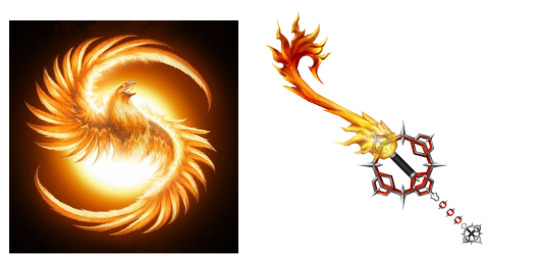
A promise… We’ll meet again…in the next life. We did say that. I remember. I remember our promise.
Which is the exact same message that Lea’s Keyblade has. The Flame Liberator is based on the Phoenix. It builds its nest, which at the same time is its funeral pyre, and then it cremates itself. But it arises anew from the ashes transformed. In alchemy, the solar bird represents the idea that the end is only the beginning and is a symbol of the Philosopher’s Stone.
“As long as we remember each other, we'll never be apart. Got it memorized?”
According to ancient lore, the process of death and rebirth happens in four stages, called Magnum Opus. The process of creating a Philosopher’s Stone involved taking a White Stone (the Moon) and turning it red. The stages are called Nigredo, Albedo, Citrinitas, and Rubedo. Both Axel and Saix have weapons that are based on these stages, going along with their respective character arcs.

“I don’t want to disappear…But still, it wouldn’t be so bad if I did. Not here.”
In alchemy, Nigredo, or blackness, means putrefaction or decomposition. Axel’s weapon is called Blaze of Glory. It represents the Phoenix’s self-immolation and also the idea of leaving behind a lasting impression before your departure.
Axel: We just exist. We are Nobodies. But your memories and existence end here. Aren’t you happy?
Vexen: S-Stop! I don’t want to-
Axel: Well, see you.
It represents the moment of maximum despair a person experiences; the dark night of the soul when everything seems hopeless. That darkness is a prerequisite to personal development. His words to Vexen are, in a way, referring to himself. Lea has lost everything he ever cared about. The past is gone forever. Like Aqua, he was trying to share that misery and despair with others.
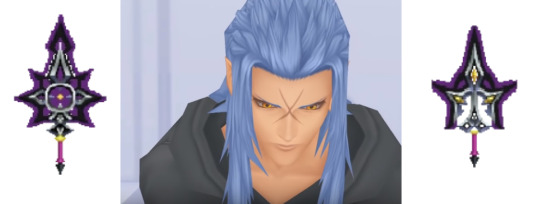
“That's absurd. He won nothing, and IS nothing. He couldn't stand the emptiness of being without a heart. And THAT led to his demise. He was foolish and weak.”
Saix’s weapons are emanating a purple aura, the most sensitive and wisest of colors. This is the intuitive color in the aura, and reveals psychic power and attunement with the self. But, like the bunny’s rocket, these weapons also have a black aura. Black draws energy to it and in so doing, transforms it. It captures light and consumes it. A black aura can indicate possession by a negative entity as well as unreleased grief. The stone on the tip is black tourmaline, which is used to release negativity and blockages and gives powerful shielding and grounding.
The weapon called Orbit has a sun symbol ☉ in the middle with a Recusant’s Sigil over the sun. The Moon and Earth orbit the Sun. Like the Phoenix, the lunar phase symbolizes the constant alternation of birth and death, creation and destruction. This weapon represents the death stage.
"Do you know what happens to those who lose their true purpose? Inevitably, they destroy themselves."
The other weapon is named Balsamic Moon. This is the symbol that Isa wears on his jacket. It is the final stage of the moon, symbolizing the death of Isa himself. Something is subconsciously gnawing away at Saix. Deep down he is utterly miserable. He thinks it's because he has no heart. I think it’s because Isa’s captured heart is wounded and in a lot of pain. It can’t stand the emptiness of losing its purpose. There’s a yellow stone on the weapon, called citrine. It carries the energies of sun as well as radiates warmth and comforting energies.
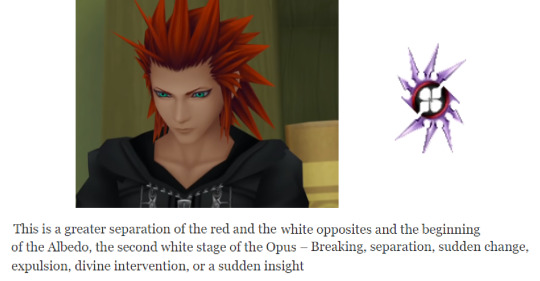
Axel and I talked for a while about the things we can't bear to lose. Axel thinks that for Nobodies, it's our pasts, because that's all we have to remember the pain of losing something.
The second stage is Albedo, meaning "whiteness". The goal of this portion of the process is to regain the original purity and receptivity of the soul. Burnout is the name of Axel’s weapon.
Xemnas: “About Axel. The poor fool. How long will he keep chasing the illusion of friendship, when he himself lacks emotion? Trying so hard to retrieve what he has lost, when it may never have existed in the first place. He deserves nothing more than our pity.”
Burnout is a state of chronic stress that leads to physical and emotional exhaustion, cynicism, detachment, feelings of ineffectiveness, and a lack of accomplishment. I think this fits Axel pretty well after he becomes a complete person again. So often, it seems like things will never work out for him. But he never gives up.

Xigbar: Xemnas and Xehanort formed the Organization for a specific reason--round up a bunch of empty husks, hook them up to Kingdom Hearts, then fill them all with the exact same heart and mind. Translation — they were gonna turn all the members into Xehanort.
Saix’s weapons are Crescent and Gibbous. Both are shaped like the Phoenix’s wings. The crescent phases are about letting go of the past and turning one’s thoughts and attention to the future. Crescent is shaped like ⚸, the symbol for Black Moon Lilith. Technically speaking, the Black Moon Lilith is a mathematical point that's exactly in between the earth and the moon. Essentially, it's empty space. Isa has been turned into an empty vessel for Xehanort.
Xehanort: "X"... A most ancient letter. Some say "kye," but the meaning is the same. Death... A letter that spells endings.
The gibbous moon is the final stop before the full moon. It’s the homestretch. It symbolizes a time when you are so close to achieving your goal. This phase is about refinement and gratitude. The stones on the weapon are gray agate. Agate raises self-awareness, stabilizes the aura, transforms negative energy, and is a powerful conduit of spirit. This stone heals anger and lack of self worth, and enhances emotional stability.
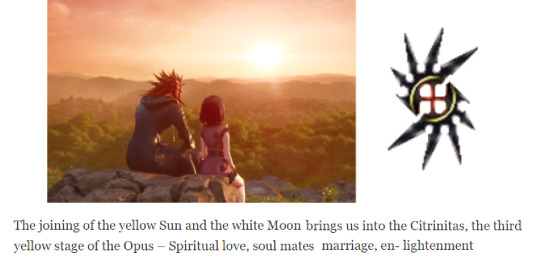
“So you don’t need a heart to have something that you can’t bear to lose then. If that’s true, then I guess the closest thing that we Nobodies have would be memories of our past. It’s the memories that create the things that we don’t want to lose.You know, memories of the stuff we couldn't bear to lose, back when we couldn't bear to lose it.”
Citrinitas, is the third stage, meaning "yellowness." In alchemy it stands for the "transmutation of silver into gold" or the "yellowing of the lunar consciousness." The dawning of the "solar light" inherent in one's being. The weapon is named Outbreak — the sudden or violent start of something unwelcome. The final battle. I think the real reason Lea kept wearing his Organization cloak is because he could never be truly free of Organization XIII until Isa was free, too. They joined together, and Lea would only leave if it was together.
Roxas: I found out about love on today's mission — that it's something powerful.
Axel: That's true. It is. But I'll never get to experience it.
Just like with Aqua, I got the feeling that he has been in love before. Axel was optimistic when he spoke about cherishing memories of the past. But when Roxas brought up love, his attitude darkened. It depressed him to think he’d never experience that special kind of love again.
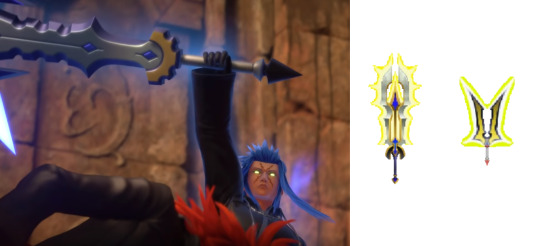
“Inside people's memories, I can live forever.”
The two weapons of Saix are Crocea Mors and Werewolf. Crocea Mors means “Yellow Death” in Latin. It was the sword of Julius Caesar, which was said to kill anyone it struck. Citrinitas is the “dawning of the solar consciousness”. The weapons have a yellow aura, the color of awakening. That’s why I think this is the scene where Saix would have remembered his true purpose. The irony of Xemnas calling Axel a fool shows itself here. The gemstone on Crocea Mors is azurite, which promotes insight, justice, and concentration. The one on Werewolf is red jasper again.
Sora: “...No. The hurt is what reminds me I've forgotten. It's proof there's something there, something...important. I won't run from it. It'll stay in my heart until the day I remember again.”
Axel spent all of 358/2 Days thinking Isa forgot him, but the only reason his heart never collapsed is because he didn’t forget him. Saix may remember Lea with his mind, but he doesn’t with his heart. With Berserk Saix, it’s the opposite. His heart had a purpose; a reason to keep existing. That was the very reason he was used as a vessel in the first place. But just like the selfless hare, that act of selflessness is also what saved his heart from breaking.
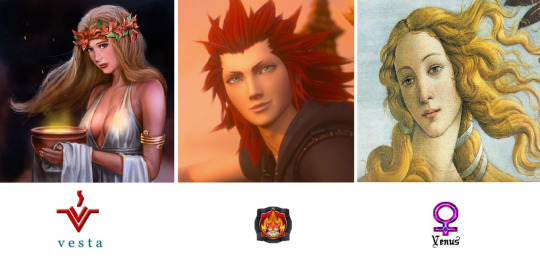
“Bet you don't know why the sun sets red. You see, light is made up of lots of colors. And out of all those colors, red is the one that travels the farthest.”
Rubedo or "redness", is the final stage of magnum opus. Both gold and the Philosopher's Stone were associated with the color red. It’s the point when a person discovers their true nature. The Phoenix symbolizes the Rubedo stage and it represents the freeing of the spirit from the bounds of the physical.
Saix’s red (er, pink — close enough) weapons are Moonset and Horoscope. Moonset is the weapon that is shaped like ⚶, the astrological symbol of Vesta. She was a Roman Goddess known as “The Keeper of the Sacred Flame”. The ⚶ is a symbol of the creative flame encompassing sacred sexuality, chastity, devotion & vigilance. The eternal flame that she protected never diminished, for she was guardian of hearth and home, family and community.
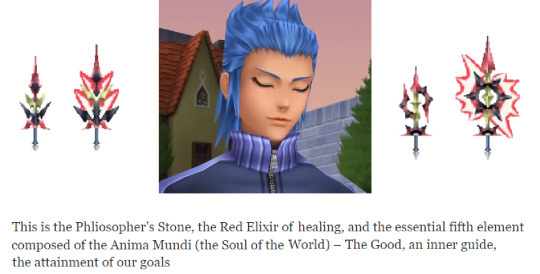
Roxas: What is it that you're so afraid of?
Riku: Huh? Hmm... Losing something that's important.
Horoscope combines the astrological symbol for Cancer ♋ with the astrological symbol for Venus ♀. Cancer is “The Sheltered Crab” of the zodiac represented by the Moon. Those born under this sign are very modest, shy, and extremely emotional individuals. Venus was the Roman goddess of love, sex, beauty, and fertility.
The silver gemstone represents protection. Both of these weapons radiate a pink aura. In Reiki, pink light represents the energy of love and has a very high vibration. It is tender, sensitive, sensual, affectionate, pure, and compassionate; it is associated with a new or newly revived romantic relationship. Pink light is soft and brings about gentle yet powerful healing. Red is the color of light that travels the farthest. This color heals Isa’s pain. But pink is the color of light that can heal Lea’s pain. The pain of losing something that’s important.
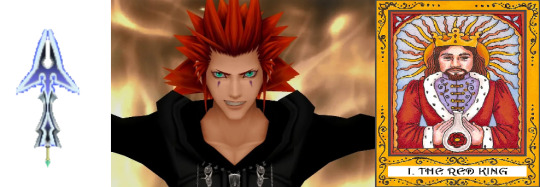
Ventus: “What is the one thing you care about more than anything else?"
Riku: “Hmm... My close friends.”
The Red King and White Queen are another symbol of the Philosopher’s Stone, along with the Phoenix. Their union is called the alchemical marriage. In alchemy, 🜍 sulfur represents Sol, the fiery male element. The counterpart is ☿ mercury representing Luna, the female element. Their marriage represents the spiritual goal of alchemy. Saix has a weapon named King of the Night shaped like a combination of 🜍 and ☿. The weapon has a silver base, the color of mercury. It has an indigo aura, indicating sensitivity to others’ energy, clarity and communication. The tip is aquamarine, meaning determination, courage, enlightenment, spiritual awareness and success. Perfect for using the power of waking on someone he cares about, like a close friend.
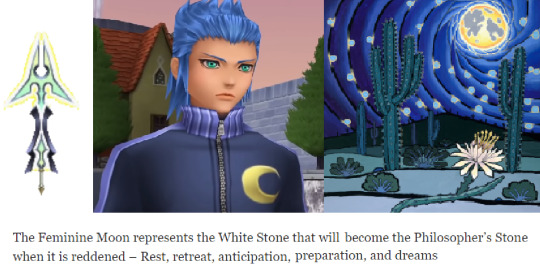
Xion: “Riku. What do you wish?”
Riku: “More questions... All right... I wish...to recover something important that I lost.”
Saix also has another weapon called Queen of the Night. The weapon has a yellow aura; the color of sulfur. It is aquamarine, also representing courage, determination, strength, communication, and success. The gemstone is aragonite for peace and calm. The name refers to a white flower that is part of the cactus family. It is one of the rarest and most expensive flowers in the world. It only blooms for one night a year, then it closes again when the sun rises.
This flower tends to bloom on days of a full moon, and thus is sometimes called the Flower from the Moon or Flower from the Heavens. It has a rich history in Japan, where it is known as the “Gekka Bijin” or “Beautiful Woman Under the Moonlight”. It is said that any wish prayed for while the flower is blooming will be fulfilled. Well, all Lea really wished for was to go back to the past. To once again experience the happiness that only existed in his memories. To recover something important that he lost.

Ansem the Wise: “Then, you came here, and you were questioned by three young people. That was the final key to awaken him. Sora is awake. You can go home now.”
The three questions were a test. Love is the key to use the power of waking. In the Realm of Sleep, time does not flow. The individual’s consciousness is forever frozen in time, until they are healed by someone who loves them. After their “birth by sleep”, a person is restored to exactly the same state as when they fell asleep. Like the hare on the moon, Isa’s selflessness would never be forgotten and he'd be reborn, just as he was before. And this is exactly how Isa would heal Lea’s pain. Simply by being the same person Lea remembered him to be. Or at least, that’s what I think should have happened.
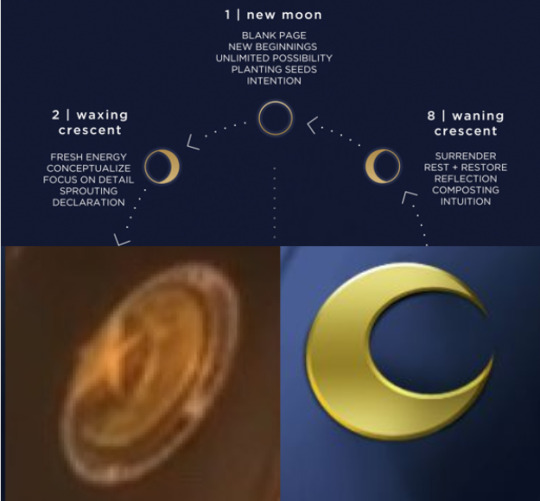
Ansem the Wise: “So many are still waiting for their new beginning. Their Birth by Sleep.”
Isa’s entire character arc was meant to be about being brought back to life by Lea. When he was a kid, the symbol on his jacket was a waning crescent, the final phase of the moon symbolizing death and endings. In the ending, the new symbol on his jacket is a waxing crescent which is the first phase of the moon symbolizing rebirth and new beginnings. The star and crescent is a symbol signifying the union of the sun and moon, complementary opposites.
#kh meta#kingdom hearts meta#kingdom hearts#akusai#kh lea#leaisa#kh isa#kh saix#kh axel#kh terra#kh aqua#kh ventus#anti-kh3#kh#KH3#kingdom hearts 3#kingdom hearts birth by sleep#kh3 spoilers#kh3 speculation
130 notes
·
View notes
Note
How do you (and many others) like people Oscar Wilde and Alfred Doglas? As a gay man, it seems wrong romanticize their relationships when we know they practiced and promoted pederasty, and in the case of Doglas, there's even a case made for pedophilia. I legitimately want to know, because I like their poetry but I feel like shit relating to it when I think about how they hired adolescent sex workers who could have very well been underage. If there's some way to reationalize it please tell me.
I want to make clear that I’m not particularly well-versed on the lives of Oscar Wilde and Alfred Douglas, so I may not be the best person to talk about their specific actions with. Regardless, this is going to be a long answer because it’s a complex issue.
I’ll quickly preface this by saying that ‘liking’ these people and being interested in them is not necessarily the same, and that I tend to reblog a lot of content about/by people who interest me but who I don’t necessarily ‘like’. I do generally like Oscar Wilde himself, but Alfred Douglas mostly just interests me. I have a lot of problems with him, both in regards to this issue as well as his anti-semitism and his treatment of Wilde. Also, one can like someone’s artistic output whilst also recognising that they were not what we would now consider ‘good’ people, or they did bad things. For me, this applies to both men. But again, I do not know enough about what they may or may not have done so I cannot say whether any of this is justified or not. And I do agree that their beliefs regarding pederasty are very closely tied with their work, so separating artist from art becomes difficult.
I can’t speak for Douglas, because I haven’t read enough about him and I don’t want to justify anything he’s done. I don’t really want to justify what Wilde has done either, and trying to rationalise his actions can be very dangerous. As always, I feel like there’s a quote from The History Boys which describes how I feel about this. Posner (on the Holocaust): ‘But to put something in context is a step towards saying it can be understood and that it can be explained. And if it can be explained, that it can be explained away.’ This is basically the debate on whether it is appropriate to assign our own beliefs on a historical period, or whether we can allow someone’s actions to be justified because ‘people thought differently then’. I do think we need to recognise that had certain activities/behaviours been seen in the past as they are now, then some people may not have taken part in them because they would have realised how unacceptable they are. But that assumes that these people did not think critically about their actions, and that seems unlikely to me.
In any case, I don’t think it’s wrong for people now to read history through the lens of our own beliefs regarding consent and what constitutes abusive or harmful sexual dynamics and practices. Although I’m generally opposed to a Whig approach to history whereby society and social beliefs have steadily progressed to an enlightened present day, I do believe that certain modern Western countries have the ‘right idea’ about the age of consent and sexual dynamics, and that is reflected in their laws. Of course, I say that as someone who has grown up in those societies and is entirely biased. But given what science has now helped us understand about sexual maturity, I feel fairly confident in believing we (by which I mean, present-day legislation regarding the age of consent) are ‘right’. That isn’t the same across the board by any means, because countries vary in their laws on the age of consent, sexual abuse, and rape, sometimes even vary within the country itself (such as states within America). They also vary in terms of who they apply to (e.g. heterosexual or homosexual relations) and whether they’re followed in a court of law in a just and appropriate manner (which is often not the case, given all the institutionalised racism, sexism, homophobia, ableism, transphobia, etc).
From what I’ve read about gay men in Britain in the nineteenth and twentieth centuries (a concept and term which is itself an anachronism, but that’s a debate for another day), there was a strong emphasis on classical Greek love, which usually meant pederasty. For there men, some of the only representations of same-sex love that they could access were those written by the ancient Greeks - the myth of Zeus and Ganymede, Platos’ Phaedrus and Symposium, and so on. As there was an existing cultural celebration of Hellenism, these myths and texts would have appeared to validate homosexuality and ensured that gay men felt that their desires were real and not unique to themselves. But as the texts argued for the intellectual/moral benefits of pederasty and usually eroticised boys of 12 years and up, these men could also have picked up harmful beliefs regarding sexual relations with pre-teen/teen boys and thus idealised imbalanced and abusive sexual dynamics. There was also the public school culture in England, whereby older boys would publicly appear to ‘fall in love’ with younger boys, or covertly have sexual relations with the younger boys and/or boys their own age. This tradition allowed older boys and young men to revel in the ‘beauty’ of younger boys, and potentially continue to revere that beauty, even into their adult life.
This perhaps explains why they were so focused on pederasty and the ‘love’ of boys, but I do not want to justify their actions in any way by putting them into context. As I said earlier, they may very well have been against the concept of pederasty had they been alive now, but given that they were already consciously going against sexual and moral beliefs at the time by being with men (quite rightly in this case, because obviously the attitude towards same-sex relations was homophobic and wrong), perhaps not. It’s unhelpful to speculate, because that just implies that they are not accountable for their actions. Yes, had there been some other kind of representation of homosexual love available to them, and had there not been such a broad cultural reverence of classical Greece, then perhaps they wouldn’t have felt as they did. But there wasn’t, and they did.
Personally, I condemn Oscar Wilde’s relations with teen boys, and it annoys me that people tend to gloss over them. I love his work, and I respect and love many aspects of his personality and beliefs, but I recognise that the (although libellous) evidence of these affairs does exist and if it is true then what he did was absolutely wrong. I wish we knew more about the lives of the boys involved, but I just hope that they were able to heal and deal with their experiences. I unreservedly condemn Douglas’s actions and his atrocious behaviour in many respects, because I’m not particularly a fan of him or his work anyway, and it seems that he had relations with younger boys than Wilde did (from what I’ve read, Wilde had relations with boys in their mid-teens and upwards). As you said, there is danger in romanticising their relationship with each other or with other men, as they were still having relations with boys at the same time. But I think once you recognise these issues, then identifying with Wilde’s writings on love between adult men is alright, as long as you don’t allow yourself to internalise his beliefs regarding love with boys. Oscar Wilde was an important man both for Western art and as a gay symbol, and as long as we acknowledge his flaws and the actions which we would now consider completely unacceptable and highly damaging, we can still enjoy his artistic and cultural output.
As you can see, this is something I’ve thought about in detail. I apologise for the overlong response, but I hope it’s understandable.
#anon#ask#oscar wilde#bosie douglas#lgbt#history#child abuse tw#paedophilia tw#this is one of the hardest messages i've ever had to respond to#so apologies if it's confusing or if it offends any of my bosie/wilde mutuals#but its important and i have to be clear about this#even if its uncomfortable
50 notes
·
View notes